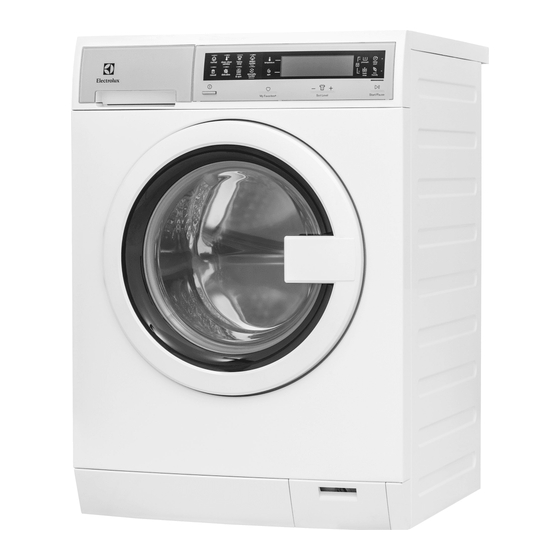Electrolux EFLS210TIS Manual de uso y mantenimiento - Página 9
Navegue en línea o descargue pdf Manual de uso y mantenimiento para Lavadora Electrolux EFLS210TIS. Electrolux EFLS210TIS 22 páginas. Front load dryer
También para Electrolux EFLS210TIS: Manual de uso y mantenimiento (29 páginas)

Cycle Selection
Not all cycles, options, or features listed are available on every model. Console shown above for
Cycle Selection
Press the power button to turn on the unit
and turn the cycle selector to the desired
cycle. The estimated drying time for Auto Dry
cycles or the actual drying time for Time Dry
cycles will be displayed on the display screen.
Default settings and options will automatically
be indicated for the cycle selected. In most
cases cycle settings and options can be
changed. See Cycle Settings, Cycle Options,
and Settings Chart for more details.
NOTE
If the cycle selector indicator is pointed at the
12 o'clock position, then "--" will be displayed.
Turning the cycle selector to any other position
will result in the default cycle settings for the
indicated dry program being illuminated.
NOTE
To change the cycle and/or settings once
the cycle has begun (after the start button
has been pressed), either rotate the knob to
the reset position (12 o'clock position) OR
press the power button to turn off the unit
and cancel the cycle. Press the power button
again to turn on the unit and select the new
cycle and/or settings, and press start to
begin. Changing a cycle selection without
canceling the current cycle WILL NOT
change the cycle.
Selecting the Right Cycle to Save
Energy
This dryer has been specifically designed with
options to help you save energy and at the
same time utilize the optimal drying setting for
your clothing.
The normal cycle was used to rate the dryer for
energy efficiency. The normal cycle defaults to
Controls and Settings
Cycle Options / Cycle Status Display
reference only. Your model may differ.
high temperature setting, normal dryness level
and eco mode option (if available) on.
Some cycles save more energy than others.
Cycles that use the least amount of heat save
the most energy. Use the lowest heat setting
(auto and timed dry cycles) and less dry setting
(auto dry cycles) to save on energy and prevent
over drying your clothing.
Auto Dry Cycles
Auto Dry cycles take the guesswork out of
selecting the correct drying time for each
load. Moisture sensors sense the moisture
level of the load as it tumbles through the
heated air. With Auto Dry cycles, the load
will automatically be dried at the selected
temperature to the desired dryness level.
Auto Dry cycles save time and energy and
protect fabrics. When the load has reached
the selected dryness level, it will continue to
tumble, unheated, during a cool down period.
This helps reduce wrinkling and makes items
easier to handle during unloading.
Drying times vary depending on size and
dampness of the load and fabric type. If the
load is too small or almost dry, the moisture
sensors may not detect enough moisture to
continue the cycle and the cycle may end
after a few minutes. If this occurs, select a
Timed Dry cycle.
Initial cycle times for Auto Dry cycles are only
estimates, the actual drying time may differ
slightly from the time displayed.
NOTE
9
